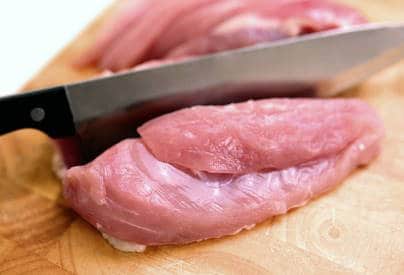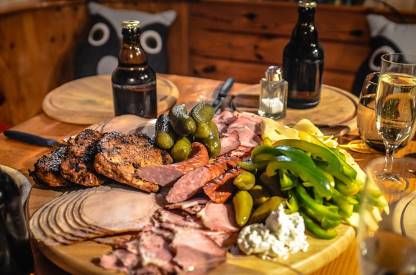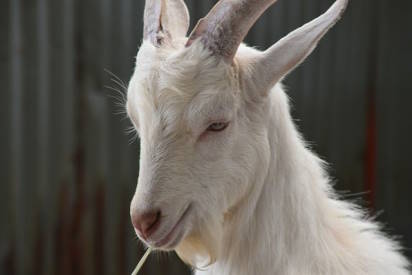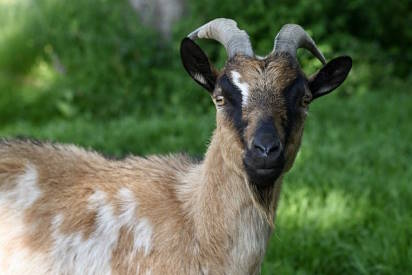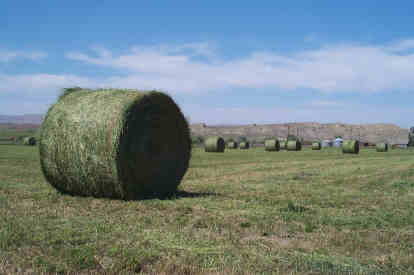Growing up on a farm, I spent countless hours watching our goats frolic and graze. Their ceaseless curiosity, often leading them to nibble on the unexpected, always sparked a question in my young mind: Can goats eat meat? Simply put, while they might nibble out of curiosity, goats are fundamentally herbivores and aren’t biologically designed to consume or digest meat.
I’ve seen our goats cheekily try to sample a bit of everything, from my clothes to the occasional misplaced apple from our orchard. This natural curiosity often leads many to wonder about the boundaries of a goat’s diet. However, even though they show interest, it must still be nutritious and safe for them.
Drawing from personal observations backed by deeper research, this article delves into the age-old question about goats and meat, shedding light on their natural dietary inclinations and the potential implications of deviating from them.
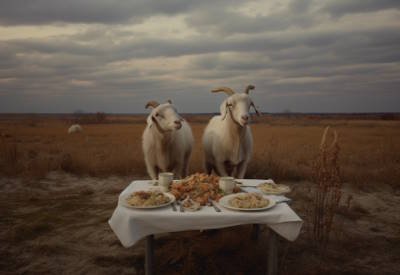
Understanding Goat Dietary Basics
Have you ever wandered onto a farm and marveled at how goats munch away at grass and shrubs? Let’s dive deep into understanding their dietary basics.
Natural grazing habits of goats
Goats are curious creatures, often found exploring their surroundings with their mouths. Typically, their natural diet consists of grass, herbs, shrubs, and sometimes even tree bark. The whole act of grazing isn’t just about filling their tummies; it’s a way for them to interact with their environment.
Key nutrients essential for goats
Like any other animal, goats need a range of nutrients to stay healthy. They thrive on a mix of carbohydrates, proteins, vitamins, and minerals that they usually get from plant-based sources. So, if you see them happily chewing on grass or herbs, they’re not just enjoying a snack; they’re getting their daily dose of nutrients!
The herbivore nature of goats
While goats are known to chew on almost anything that comes their way, it’s a common misconception that they eat everything. Naturally, goats are herbivores. This means their primary diet is plant-based, and they aren’t biologically designed to digest meat.
[GoatAffiliate]
Unusual Eating Habits in Goats
“Did my goat just try to munch on my shirt?” Goats can sometimes surprise us with their unusual eating habits.
Why goats chew on inedible objects
Have you ever witnessed a goat trying to nibble on something clearly inedible? Goats use their mouths to explore the world around them, much like how babies put everything in their mouths. This doesn’t mean they’re trying to eat everything they taste.
Instances of goats eating unconventional items
From cardboard to plastic bags, goats might give a lot of unconventional items a curious nibble. However, a bite doesn’t necessarily translate to consumption. It’s more about understanding their environment.
Dispelling the myth: Goats eat everything
It’s a chucklesome thought, imagining goats chomping down on any and everything. But in reality, while they are curious and will explore many items, they are discerning about what they swallow.
Can Goats Eat Meat?
The debate around whether goats can eat meat, or more importantly, whether they should, is intriguing. While their typical diet might suggest otherwise, let’s delve deeper into this question.
The Biological Perspective
Biologically speaking, goats are designed to be herbivores. Their stomachs, particularly their rumen (one of the four chambers), are optimized to ferment plant-based foods. This system allows them to break down tough plant fibers and extract nutrients. While they can technically eat meat, their system is not designed to digest it efficiently, leading to potential health issues.
Anecdotal Evidence
While uncommon, there have been occasional reports of goats consuming small amounts of meat or animal byproducts. Some farmers have noticed their goats nibbling on fish or bone meal, which are sometimes added to animal feeds. However, these rare instances don’t necessarily mean it’s a regular or healthy part of their diet.
Implications for Goat Well-being
The consensus is that even if goats can consume meat, it isn’t in their best interest. Feeding them meat can introduce unfamiliar proteins and fats that their digestive system cannot handle. Over time, this could lead to digestive problems, nutritional imbalances, and even behavioral changes.
Are Any Meats Safe for Goats?
Dabbling in the world of unconventional diets for our farm friends, one might wonder if any meat out there is safe for goats. With their primarily herbivorous diet, can any meat be safely introduced?
The Nutritional Aspect
When considering any food for goats, weighing its nutritional value is crucial. Meats, in general, are high in proteins and fats. While proteins are essential for growth and repair, the kind found in meat isn’t the same as what goats derive from their typical plant-based diets. This means that while they might consume meat, they won’t necessarily derive the intended nutritional benefits from it.
Processed vs. Raw Meat
Raw meat, especially when it’s not fresh, can be a breeding ground for bacteria and parasites. Processed meats, on the other hand, might contain additives, preservatives, and spices that aren’t suitable for goat consumption. So, neither is ideal for our caprine friends, whether it’s a slice of ham or a piece of raw chicken.
Occasional Meat-Based Products
While direct meats might not be suitable, goats might come across some meat-based products like bone meal or fish meal, especially in mixed feeds. These are not direct meat chunks but are derived from animal products. They aren’t typically harmful in small amounts and when sourced responsibly, but they shouldn’t constitute a significant portion of the goat’s diet.
Health Implications of Feeding Meat to Goats
Now, moving on to the meat of the matter. What happens when goats consume meat?
Digestive system challenges
Goats, by nature, have a digestive system designed to process plant materials. Introducing meat can upset this balance. It can lead to indigestion, bloating, and other gastrointestinal issues.
Potential for nutrient imbalances
Feeding goats meat can disrupt their nutrient intake. Meats might introduce higher levels of proteins and fats not common in their diet. This imbalance can impact their overall health and development.
Risks of diseases or parasites from meat
Meat, especially if raw or not sourced properly, can introduce a range of parasites or diseases to goats. Their system isn’t equipped to handle such threats in the same way carnivorous animals might be.
Behavioral Impact of Introducing Meat to Goat Diets
Aside from the physical implications, can meat influence a goat’s behavior?
Effects on aggression or territorial behaviors
Introducing an unnatural diet can cause changes in behavior. While there isn’t concrete evidence, some goat owners believe feeding goats meat or animal-based products can increase aggression or territorial disputes.
Changes in social interactions among goats
Diet plays a crucial role in an animal’s well-being. Any drastic change, like introducing meat, might affect a goat’s mood, potentially making them more withdrawn or irritable when interacting with their peers.
Effects on their grazing patterns
If goats develop a taste for something other than their traditional diet, they might become less inclined to graze on grasses and shrubs, which could impact their health in the long run.
Alternatives and Safe Supplements for Goat Diets
If not meat, then what? Let’s explore some safe dietary options for our hoofed friends.
What to feed goats for optimal health
Stick to natural forage, grains, and goat-specific feed for optimal health. Fresh water, hay, grains like corn or barley, and mineral blocks can make up a balanced diet for most goats.
Healthy treats and supplements
While treating goats with kitchen scraps or fruits is tempting, always do so in moderation. Fruits, veggies, and even some tree branches (like apple branches) can be delightful treats for goats.
Potential foods to avoid
Avoid feeding goats meat, processed foods, or anything high in chemicals or artificial substances. When in doubt, always revert to natural plant-based options or consult with a local farmer or vet.
What Other Processed Food Can Goats Eat Apart from Meat?
While our curiosity often steers us towards exploring the dietary boundaries of our caprine friends, it’s essential to be cautious. Processed foods, which humans relish, might not always be the best choices for our four-legged pals. Let’s look closely at some common processed food items and their suitability for goats.
Chocolate
Is it good for goats? The answer is a firm no. Chocolate contains theobromine, a toxic compound for many animals, goats included. Even in small amounts, chocolate can lead to health issues. So, as tempting as sharing a bite of your chocolate bar might be, it’s best to resist.
Read More: Can Goats Eat Chocolate? 5 Reasons It’s Not A Good Idea
Raisins
Raisins and grapes, in general, are known to be toxic to some animals, like dogs. While there isn’t substantial evidence pointing to their toxicity in goats, it’s still a grey area. As a precautionary measure, keeping raisins off their menu is wise.
Read More: Can Goats Eat Raisins? Full Answer Revealed
Peanut Butter
Peanut butter, in moderation, can be an occasional treat. It’s high in fats, so it shouldn’t make up a significant portion of their diet. However, a little dollop now and then, especially as a treat or to administer medication, shouldn’t harm them. Just ensure it doesn’t contain xylitol, a sweetener that can be harmful.
Read More: Can Goats Eat Peanut Butter? 5 Amazing Benefits
Cheese
Cheese is a dairy product; interestingly, goats produce milk from which many delicious cheeses are made! Offering them a small piece of cheese isn’t harmful. However, it’s essential to ensure it’s fresh and doesn’t contain any additives or spices that might be harmful.
Read More: Can Goats Eat Cheese: 5 Reasons It’s Not A Good Idea
Honey
Honey is natural and packed with sugars. In small quantities, it can be a sweet treat for your goat. While it’s not nutritionally necessary for them, a little drizzle of honey on their food or a lick from your finger can be a delightful treat without any adverse effects.
Read More: Can Goats Eat Honey? Simple Answer & Feeding Tips
Remember, goats have a stomach designed primarily for fermenting tough plant materials. While they can handle occasional deviations, the core of their diet should always be plant-based to ensure their health and longevity.
Can goats eat meat – final thoughts
So, can goats eat meat? After our enlightening journey through goat dietary history, curious munching habits, and the potential consequences of introducing meat to their plates, we’ve landed on a resounding “It’s not their jam.” Our adorable herbivorous buddies, with their undying love for greens, shrubs, and the occasional mischievous nibble on our belongings, aren’t exactly gearing up for a steak dinner.
In the ever-fascinating world of goats, it’s clear that their playful curiosity doesn’t equate to a dietary green light. While they might give many things a taste test (including our patience at times), it’s best to stick to the script regarding their meals. After all, greens are the true goat’s treat!
Related Articles:


